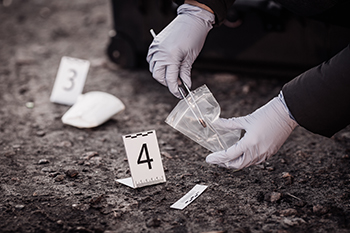Guide: Graduating Criminology
If you are searching for a career that combines excitement, complex subjects, and the opportunity to help others, criminology is a field to consider.

Criminology offers a wide array of choices; both in types of study and a variety of careers. Jobs may intersect with some exciting areas of criminal justice, like law enforcement or forensic science technology. Other careers are more academic and focus on particular studies including forensics and criminal law.
In this article, we will cover the study and degree of Criminology, differences between Criminology and Criminal Justice, Criminology internships, and the careers available with a degree in Criminology. Let’s jump in!
Criminology: The Study and Degree
Criminology is the study of all areas of crime. It is a branch of sociology, which examines the effects of social behavior. The varied professions of criminology study the causes, effects, and prevention of violations.

Criminologists investigate the impact of criminality on society as a whole. Studying the effects of criminality on victims, society, environment, and even criminals can bring a clearer understanding of how to prevent crimes in the future.
A criminology degree states that you have the required education to work within the justice system or any of the careers related to crimes and criminal law. Probation officers in a small town, criminal attorneys, social workers advocating for victims, and members of homeland security all need a degree in criminology.
The criminology field is separated into two major sections of study: criminalistics and criminology. Both of these subsets investigate violations, study evidence, and work to advance criminal prevention. However, they examine different parts of the same puzzle to create a clear definition of how an infraction occurred.
- Criminalistics is a field of study directly related to the study of physical clues from a violation. Criminalists use a background in science to solve crimes using physical evidence such as fingerprints, bloodstains, fibers, and drugs. Criminologists work in labs, at the scene of an infraction, and testify in courts.
- Criminology studies crimes in relation to criminals and potential corrections. Criminologists study offenses and the laws to provide an explanation for criminal behavior. They learn sociology and psychology to determine normal and abnormal social behavior and provide criminal profiles. Criminologists may work at universities, corrections systems, FBI, or homeland security.
Criminology vs Criminal Justice
Degrees in criminology and criminal justice overlap in some areas. Some students earn a bachelor’s degree in criminal justice, then go on to get a criminology degree. Both fields study core classes to learn about science, sociology, and the laws surrounding the elements of criminality. However, the professions study crimes with different goals in mind.
- Criminology is the study of crime related to criminals, backgrounds, costs, and consequences. Careers in criminology use the study of criminal behavior to learn ways to prevent the circumstances that lead to offenses by predicting criminal behavior. Some professions help to discover ways to improve law enforcement tactics and develop new scientific advancements in forensics. Qualifications for an entry level job in criminology likely requires a degree.
- Criminal Justice is the system where criminals are discovered, caught, and punished. Careers in criminal justice relate closely to the justice system and the creation and enforcement of laws. Students of criminal justice are likely interested in professions in the police force, the court system, or the corrections system. Criminal justice works to compensate victims and their families with the capture and punishment of criminals. Some entry level job requirements in criminal justice can be obtained with a high school diploma or a GED.
Careers Available with a Criminology Degree
Different degrees in criminology offer a wide variety of careers.

Professions include police work, criminal and forensic psychology, social work, and crime scene investigation. The average salary for each job can vary. The different positions within these fields provide a wide range of choices when deciding between education and types of careers available in criminology. Potential jobs are directly related to the degree you earn.
- An Associate Degree in Criminology is a degree obtained in about two years if you are a full-time student. It can extend to three years for a part-time student. Careers available with this degree include professions in law, the police academy, and security.
- A Bachelor’s Degree in Criminology takes about four years to acquire. It widens job choices considerably. Some professions include social worker, federal agent, paralegal, and private detective.
- A Master Degree in Criminology requires three to four more years of study after a bachelor’s degree is obtained. The purpose of a master’s degree is often to assist advancement in careers obtained with a bachelor’s in criminology. It is also an important step in getting a doctorate degree.
- A Doctorate in Criminology takes an additional four to five years of study after completing the master degree. A doctorate gives you the opportunity to specialize in specific areas of interest. Some fields for potential specialists to consider include victimology, forensic science, and federal intelligence careers.
Getting Your Criminology Degree
Like many other things related to criminology, the amount of time it takes to get your degree can have a wide range.

An associate degree can take less than two years to get but obtaining a doctorate in criminology will require around 12 – 13 years of education. If you are undecided about which profession within the field interests you, there will probably be a chance within the early years of study to make a decision. After obtaining your high school diploma or GED, the early requirements for a criminology are often the same.
Prerequisite courses are generally required to begin courses leading to your criminology degree. These courses may include political science, sociology, humanities, communications, and statistics. Some major fields of study include criminal justice, juvenile delinquency, sociology, psychology, and criminology research. To obtain a master’s degree, you must first get your bachelor’s. A doctorate requires the completion of study for a master’s degree.
Criminologist Internships
A criminology degree might not require the completion of an internship. However, it can help advance your education and determine valuable choices about your future. An internship program allows students to gain real work experience in one of the fields related to criminology.

Criminologist internships help students put the knowledge they have learned in the classroom into practice. They allow students to make valuable professional connections. Internships often turn into long-term jobs.
Criminology programs might not provide an internship as a necessary part of the program, but they are likely available. It is the student’s responsibility to secure an internship by seeking help from a career service professional or an advisor. Some criminology internship opportunities may include lawyer’s offices, correctional facilities, or working with parole and probation officers.
A criminology degree can offer you a rewarding profession helping people in a variety of ways. The average salary for jobs in the field of criminology can meet or exceed what is offered in many professions. The study of criminology offers a diverse range of interesting and exciting job choices that allow you to help shape a better, safer, and happier society.